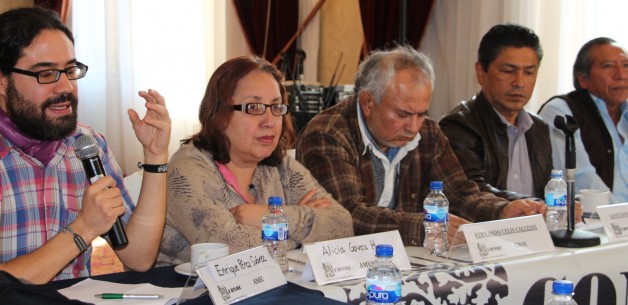This post is also available in: Spanish
Photo courtesy of CONOC
In a press conference on February 3, 2014, Mexico’s Consejo Nacional de Organizaciones Campesinas (CONOC), a group representing rural farmer and peasant organizations, voiced concerns that forthcoming agricultural reform in Mexico will privatize the lands and territories held by indigenous and campesino communities, violating their rights in favor of the interests of large agricultural and mining corporations.
The press conference was held in response to Mexican President Enrique Peña Nieto’s announcement on January 6 that the government will pursue a sweeping land reform this year. He declared that the federal government will push forward a transformation of the legal framework regulating the agricultural sector in 2014, working toward a “more modern and successful Mexico.”
Enrique Martínez y Martínez, Secretary of Agriculture, Livestock, Rural Development, Fisheries, and Food (SAGARPA), stated that “77% [of cultivable land in Mexico] is small parcels of less than five hectares, which makes productive agricultural and livestock production unviable,” and that parcels should cluster together in order to decrease costs and become more economically competitive. Given that only 3% of communal lands have chosen to privatize since 1992, SAGARPA will seek judicial reforms to allow a quicker transition from public to private lands, according to CONOC.

CONOC representatives at the press conference on Feb. 3, 2014. Photo courtesy of CONOC.
Although the details of the land reform in question have not yet been revealed, CONOC fears that reforms will signify further privatization of the common lands upon which campesino communities depend. From 1917 to 1992, the Mexican government redistributed over 50 percent of the country’s arable land to ejidos and comunidades – communal or social land tenure systems – but it has since begun to allow privatization of certain communal lands.
“It is unacceptable that the Federal Government, when land reform is discussed, prioritizes legal changes to land tenure that would facilitate the privatization of the territories and lands of indigenous and campesino communities, in addition to facilitating access and land grabbing by the mining, hydroelectric, wind power, forestry, tourism, land development sectors,” CONOC said in a statement.
To respect the land and territories of indigenous and campesino communities, CONOC put forth the following principles:
- Stop legal modifications to land tenure that would affect indigenous and campesino communities.
- Respect for the territories and lands of the indigenous and campesino communities, and cancellation of the concessions that affect them awarded to mining, hydroelectric, wind power, forestry, tourism, land development sectors, etc.
- Policies that promote farm production and improve living conditions for campesino families.
- A guaranteed, remunerative pricing system and certainty that crops will be commercialized.
- Promotion of the campesino associations, respecting their autonomous, self-managing processes, and their operation in free, equal, and democratic conditions.
For more information, see the statement released by CONOC (in Spanish) and the organization’s website.

